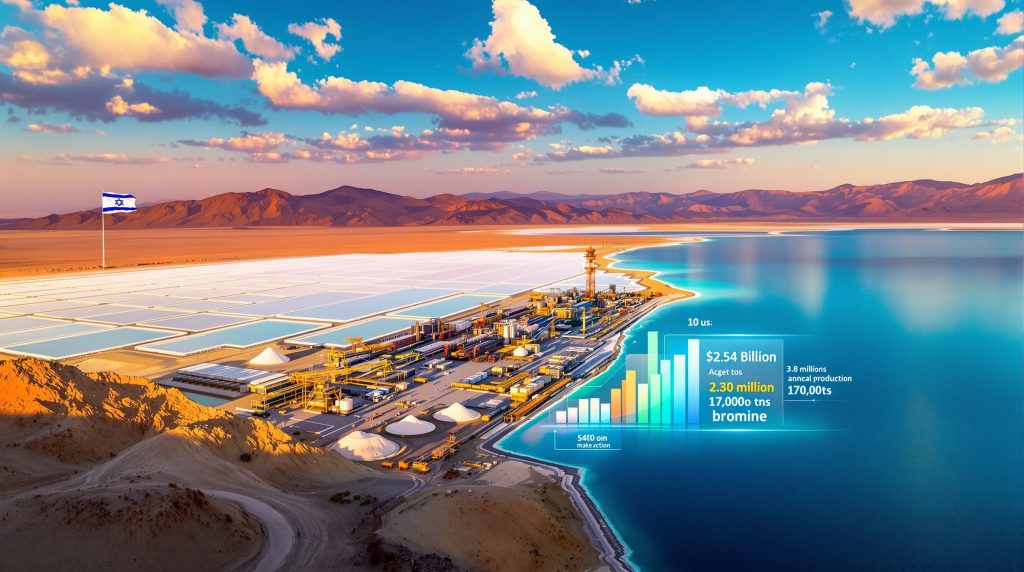Understanding the Strategic Importance of Dead Sea Mineral Rights
The Israeli government's decision to open competitive bidding for one of the world's most valuable mineral extraction sites represents a watershed moment in resource management. This tender involves exclusive rights to harvest critical industrial minerals from the hypersaline waters of the southern Dead Sea basin, generating billions in annual revenue through potash, bromine, and magnesium production.
The ICL Dead Sea concession tender encompasses operations that have generated approximately $2.1 billion annually in revenue, representing 30% of ICL's total $7 billion revenue stream. Furthermore, this development reflects broader industry evolution trends where competitive tendering processes are becoming increasingly common in natural resource management. The site produces 3.8 million tons of potash and 170,000 tons of bromine each year, making it one of the most concentrated and efficient mineral extraction operations globally.
ICL's five-decade operational history at the Dead Sea began in 1975 when the state-owned Israel Chemicals acquired Dead Sea Works, which had held the concession since 1961. This represents one of the longest continuous operational periods for a single operator on a major mineral extraction site, providing unprecedented institutional knowledge of hypersaline mineral processing techniques.
The Dead Sea's unique hypersaline composition – approximately 10 times saltier than ocean water at 34% salinity – creates natural concentration advantages that reduce processing costs compared to conventional potash mining operations in locations like Saskatchewan or Belarus. Consequently, these geological advantages have made the site economically viable for integrated multi-mineral extraction spanning potash, bromine, and magnesium production simultaneously.
Key Financial Metrics and Valuation Framework
The ICL Dead Sea concession tender valuation framework reflects substantial disagreement between ICL's internal assessment and government-negotiated terms. ICL initially claimed the assets were worth $6 billion, while the memorandum of understanding established a base valuation of $2.54 billion plus reimbursement of actual project costs, creating an approximate total package value of $3 billion.
| Financial Metric | Value | Source |
|---|---|---|
| Base Asset Valuation | $2.54 billion | Government MOU |
| Total Package Value | ~$3 billion | Including project costs |
| ICL's Claimed Value | $6 billion | ICL statements |
| Annual Revenue Contribution | ~$2.1 billion | 30% of ICL's $7B revenue |
| Market Cap Impact | 16.5% share decline | NYSE reaction |
The 57.6% discount from ICL's claimed valuation to the government-agreed base value suggests significant disagreement about asset worth. However, market reaction supported ICL's higher valuation assessment, with New York-listed shares declining 16.5% immediately following the announcement, indicating investors valued the concession above the negotiated settlement terms.
Production economics reveal impressive unit economics for Dead Sea operations. With 3.8 million tons of annual potash production contributing to approximately $2.1 billion in revenue, the implied revenue per ton approaches $553, reflecting the premium pricing that Dead Sea potash commands due to its high purity and unique mineral composition.
ICL's financial perspective, as communicated to the Tel Aviv Stock Exchange, emphasised that the memorandum of understanding removed significant uncertainty and risk around concession termination while providing asset valuation clarity and transition planning capabilities through 2030.
Timeline and Competitive Framework
The ICL Dead Sea concession tender follows a carefully structured five-year timeline designed to maximise competitive participation while ensuring operational continuity. The process spans three distinct phases, each addressing specific transition requirements.
Phase 1 (2025-2026): International Qualification Period
- Financial capability assessment for potential bidders
- Environmental compliance expertise verification
- Technical due diligence on existing Dead Sea infrastructure
- Operational experience evaluation in hypersaline mineral extraction
Phase 2 (2027): Evaluation and Selection
- Comprehensive bid evaluation across financial and non-financial criteria
- Environmental rehabilitation plan assessment
- Regional economic development commitment review
- Technology implementation proposal evaluation
Phase 3 (2030): Asset Transfer and Handover
- Complete operational transfer of all Dead Sea infrastructure
- Workforce transition from ICL to winning bidder
- Supply chain and customer relationship transfer
- Regulatory compliance certification completion
This extended timeline provides the successful bidder approximately three years between selection and operational handover, allowing comprehensive transition planning and infrastructure preparation. In addition, the timeline reflects lessons learned from complex asset transfers in the global mining sector, where rushed transitions often create operational disruptions and safety risks.
The Israeli Finance Ministry's characterisation of the process as a "competitive, international and equitable tender" signals commitment to transparent bidding procedures that provide qualified parties equal participation opportunity, regardless of existing operational relationships or historical connections to the site.
Evaluation Criteria Beyond Financial Bids
The ICL Dead Sea concession tender evaluation framework extends significantly beyond financial capacity assessment, reflecting modern mine planning approaches that prioritise comprehensive operational excellence and environmental stewardship.
Critical Evaluation Components: Successful bidders must demonstrate integrated capabilities across environmental restoration, regional economic development, advanced technology implementation, and comprehensive workforce programs.
Mandatory Environmental Requirements:
- Ecosystem restoration plans addressing Dead Sea water level decline
- Industrial waste management and reduction protocols
- Water conservation innovation and implementation
- Biodiversity protection measures and monitoring systems
Economic Development Commitments:
- Regional employment creation and retention programs
- Community investment and infrastructure development
- Technology transfer initiatives with local partners
- Supply chain development prioritising regional suppliers
Technology Implementation Standards:
- Advanced extraction technology integration plans
- Environmental monitoring system upgrades
- Process optimisation and automation capabilities
- Waste reduction and resource recovery innovations
Workforce Development Programs:
- Retention commitments for existing Dead Sea operations employees
- Skills development and professional training initiatives
- Career advancement pathway creation
- Regional employment prioritisation policies
This multi-dimensional evaluation approach reflects global trends in natural resource management, where governments increasingly recognise that optimal long-term value creation requires operators capable of balancing economic extraction with environmental stewardship and community development.
Dead Sea Ecosystem Challenges
The ICL Dead Sea concession tender operates within one of Earth's most rapidly changing ecosystems, where mineral extraction interfaces directly with environmental sustainability challenges. Furthermore, the Dead Sea has experienced approximately one metre of water level decline annually in recent decades, representing one of the world's most dramatic environmental transformations.
Environmental Pressure Points:
- Hydrological Stress: Terminal water body with no natural outflow, dependent entirely on Jordan River inflow and seasonal precipitation
- Salinity Concentration: Extreme hypersalinity creates unique biological niches while limiting ecosystem resilience
- Extraction-Environment Interactions: Mineral removal through evaporation ponds and chemical precipitation alters natural water circulation patterns
- Climate Change Compounding: Reduced regional precipitation and increased evaporation rates amplify existing environmental pressures
The Dead Sea's unique biological characteristics include highly specialised halophilic microorganisms adapted to extreme salinity conditions. These endemic species face increasing pressure as water chemistry changes due to both natural environmental trends and industrial extraction activities.
Operational Environmental Impacts:
- Potash production requires removing significant volumes of mineral-rich brines
- Bromine and magnesium extraction further concentrates remaining waters
- Evaporation pond systems occupy substantial land areas and modify local hydrology
- Waste stream management becomes increasingly complex as brine concentrations change
Future concession operators must navigate the fundamental tension between maximising mineral extraction efficiency and preserving this unique ecosystem. Consequently, the regulatory framework requires comprehensive environmental management that could significantly impact operational methodologies and cost structures compared to conventional mining environments.
ICL's Competitive Advantages
Despite relinquishing first refusal rights in the ICL Dead Sea concession tender, ICL maintains several substantial competitive advantages that position the company favourably for the upcoming bidding process.
Operational Expertise and Institutional Knowledge:
- Five decades of site-specific extraction experience accumulated since 1975 acquisition
- Comprehensive understanding of Dead Sea's unique geological and chemical characteristics
- Proven ability to operate profitably in hypersaline extraction environments
- Established protocols for managing environmental compliance in sensitive ecosystems
Infrastructure and Supply Chain Integration:
- Existing integrated processing infrastructure already optimised for Dead Sea mineral characteristics
- Established supply chain relationships with major Asian markets, particularly China and India
- Proven logistics capabilities for high-volume potash and bromine distribution
- Existing customer contracts providing revenue stability during transition uncertainty
Technical and Operational Capabilities:
- Specialised knowledge of hypersaline mineral extraction techniques
- Integrated multi-mineral processing capabilities (potash, bromine, magnesium simultaneously)
- Environmental management systems adapted to Dead Sea ecosystem requirements
- Workforce with decades of site-specific operational experience
ICL's statement that it "continues to believe that it is the most suitable candidate for operating the future concession" reflects confidence in these accumulated advantages. The company's emphasis on "experience and expertise" acknowledges that Dead Sea operations require specialised capabilities not readily transferable from conventional mining environments.
However, the memorandum of understanding also provides ICL strategic flexibility. If unsuccessful in the tender, the company could utilise the approximately $3 billion compensation to expand operations in advanced agriculture technology, phosphate mining enhancement, bromine production upgrades, and flame retardant market expansion.
What Challenges Might New Operators Face?
New operators entering the Dead Sea mineral extraction sector would face significant technical and operational challenges. The hypersaline environment requires specialised equipment resistant to extreme corrosion, whilst the unique chemical composition demands processing expertise that cannot be easily acquired from conventional mining operations.
Moreover, implementing effective waste management solutions in this sensitive ecosystem presents additional complexity, as traditional industrial waste management approaches may not be suitable for the Dead Sea's unique environmental conditions.
Potash Market Implications
The ICL Dead Sea concession tender carries significant implications for global fertiliser supply chains, particularly given the site's production of 3.8 million tons of potash annually. Dead Sea potash represents a critical component of global agricultural fertiliser supply, with established distribution networks spanning multiple continents.
Global Market Position:
Dead Sea potash typically commands premium pricing in international markets due to its high purity levels and unique mineral composition. The site's production contributes meaningfully to global potash availability, particularly for specialty applications requiring high-grade materials.
Supply Chain Considerations:
- Existing Long-term Contracts: ICL maintains ongoing potash supply agreements with major customers in China and India
- Transportation Infrastructure: Established logistics networks optimised for Dead Sea mineral export
- Quality Specifications: Dead Sea potash meets unique quality standards for specialised industrial and agricultural applications
- Alternative Sourcing Challenges: Limited global alternatives for hypersaline-extracted potash with equivalent characteristics
Market Transition Risks:
Any operational disruption during the 2030 transition period could affect international fertiliser pricing and availability. The specialised nature of Dead Sea potash means that supply interruptions cannot easily be compensated through increased production at conventional potash mining operations in Canada, Russia, or Belarus.
Strategic Customer Relationships:
The transition period requires careful management of existing customer relationships, particularly long-term supply agreements with Asian markets. In addition, the winning bidder must demonstrate capability to honour existing contracts while potentially renegotiating terms to reflect new operational realities.
ICL's Transition Strategy
Facing potential loss of the Dead Sea concession through the ICL Dead Sea concession tender, ICL has outlined comprehensive strategies for utilising the approximately $3 billion compensation package to strengthen other business segments and maintain growth trajectory.
Strategic Reinvestment Opportunities:
Advanced Agriculture Technology Development:
- Expansion of precision farming solutions and crop nutrition technologies
- Investment in sustainable agriculture practices and climate-resilient farming systems
- Development of specialised fertilisers for emerging agricultural markets
Phosphate Mining Operations Enhancement:
- Capacity expansion at existing phosphate facilities
- Technology upgrades for improved extraction efficiency
- Geographic diversification of phosphate operations
Bromine Production Facility Upgrades:
- Modernisation of existing bromine extraction and processing capabilities
- Expansion into high-value bromine applications and derivatives
- Investment in environmental compliance and sustainability improvements
Flame Retardant Market Expansion:
- Product development for emerging flame retardant applications
- Geographic market expansion for specialty chemical products
- Investment in research and development for next-generation materials
ICL's diversification strategy acknowledges that losing the Dead Sea concession, while significant, does not fundamentally undermine the company's long-term viability. Furthermore, the compensation package provides substantial capital for strategic reinvestment across ICL's remaining business portfolio.
Industry sources suggest that ICL's transition planning reflects broader recognition within the company that the Dead Sea concession, while historically crucial, represents concentration risk that diversification could help mitigate over the long term.
Looking Ahead: Technology and Innovation Opportunities
The ICL Dead Sea concession tender presents unprecedented opportunities for implementing next-generation extraction technologies that could simultaneously improve operational efficiency and environmental performance. The transition to a new operator creates a natural inflection point for technological advancement and process innovation.
Advanced Automation and Process Optimisation:
- AI-driven process control systems for optimised mineral extraction
- Automated monitoring and adjustment of evaporation pond chemistry
- Predictive maintenance systems for complex processing equipment
- Integration of Internet of Things (IoT) sensors for real-time operational data
Environmental Monitoring and Management:
- Satellite-based monitoring of Dead Sea ecosystem changes
- Advanced water chemistry analysis and modelling systems
- Automated waste stream management and treatment technologies
- Real-time biodiversity monitoring and protection systems
Resource Recovery and Efficiency Enhancement:
- Advanced separation technologies for improved mineral recovery rates
- Waste heat recovery systems for energy efficiency improvements
- Water recycling and conservation technology implementation
- By-product recovery systems for value-added material production
Sustainable Operations Integration:
- Renewable energy integration for processing operations
- Carbon footprint reduction technologies and methodologies
- Circular economy principles applied to waste stream management
- Climate adaptation strategies for changing environmental conditions
The winning bidder's technology implementation plans will be evaluated as part of the tender process, creating incentives for proposing innovative solutions that address both operational efficiency and environmental stewardship requirements. This shift towards data-driven mining operations reflects broader industry trends emphasising technological advancement and environmental responsibility.
Global Resource Management Precedent
The ICL Dead Sea concession tender establishes important precedents for how governments manage valuable natural resources, balancing economic returns with environmental stewardship and competitive market dynamics. The outcome may influence similar resource management decisions worldwide, particularly as government intervention in mining becomes increasingly common across various jurisdictions.
Transparent Competitive Process Benefits:
- Maximises public value extraction from natural resources through competitive bidding
- Ensures qualified operators compete on merit rather than historical relationships
- Creates incentives for operational and environmental excellence
- Establishes market-driven asset valuations rather than negotiated settlements
Environmental Integration in Resource Management:
- Demonstrates integration of ecosystem preservation with resource extraction
- Establishes environmental compliance as core evaluation criterion
- Creates precedent for comprehensive environmental rehabilitation requirements
- Shows feasibility of balancing economic and environmental objectives
International Competitive Participation:
- Opens historically closed resource extraction to international competition
- Creates opportunities for technology transfer and innovation
- Establishes transparent evaluation criteria for complex resource assets
- Demonstrates commitment to equitable, merit-based operator selection
Key Takeaways for Industry Observers:
- Competitive Transparency: Open tender processes can maximise public benefit from natural resource extraction while ensuring qualified operators
- Environmental Evolution: Modern resource management increasingly integrates environmental stewardship as core operational requirement
- Operational Expertise Value: Specialised extraction environments continue requiring deep technical knowledge and site-specific experience
- Innovation Incentives: Competitive processes drive technological advancement and operational efficiency improvements
The ICL Dead Sea concession tender represents more than a simple asset transfer. It embodies evolving approaches to natural resource management that prioritise long-term sustainability alongside economic value creation, potentially influencing resource management practices globally as governments seek to balance public benefit with private sector efficiency. Moreover, the Israeli government's tender process demonstrates how environmental concerns are increasingly shaping natural resource policy decisions.
Disclaimer: This analysis contains forward-looking statements and speculative elements regarding the ICL Dead Sea concession tender process. Actual outcomes may differ significantly from projections discussed. Information is provided for educational purposes and should not be construed as investment advice. Readers should consult qualified professionals before making investment decisions related to ICL or other companies mentioned.
Ready to Identify the Next Major Resource Discovery?
Discovery Alert's proprietary Discovery IQ model delivers instant notifications on significant ASX mineral discoveries, empowering subscribers to capitalise on actionable opportunities before they reach mainstream attention. Begin your 30-day free trial today to gain the market-leading advantage that comes from identifying transformative resource discoveries as soon as they're announced.




